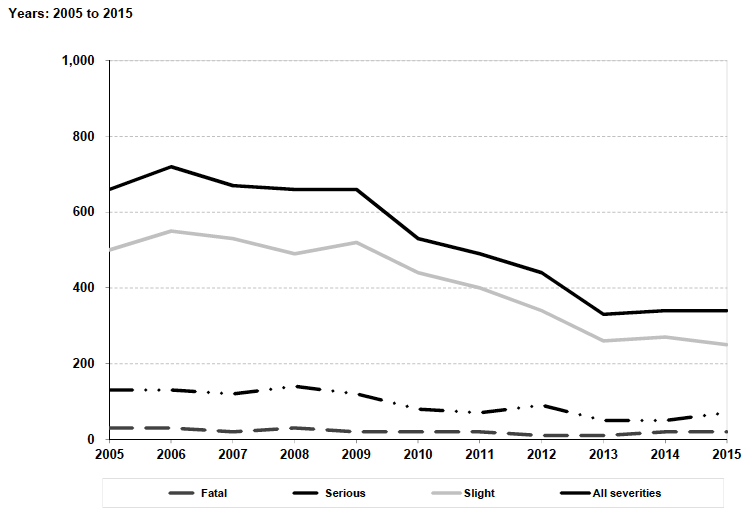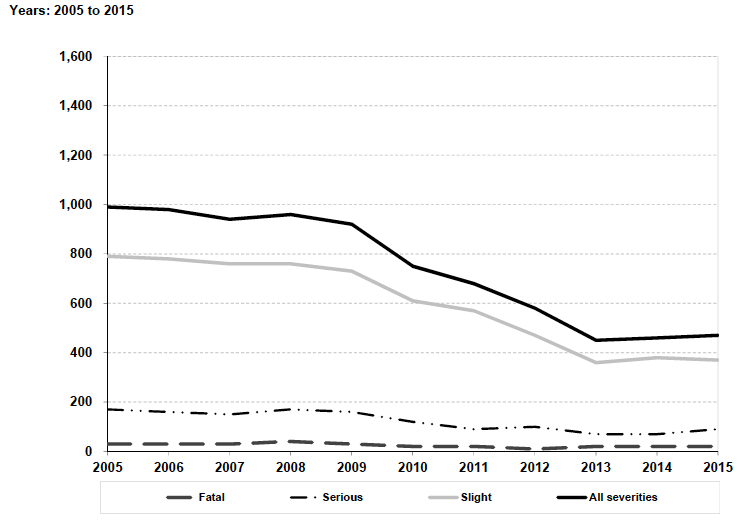SCT09170291561-33
Table 22: Drink Drive
(a) Estimated number of reported drink drive accidents
Years: 2005 to 2015

(b) Estimated number of reported drink drive casualties
Years: 2004 to 2014

Drink-drive accidents and casualties
Drink-drive estimates: background
1. The Department for Transport (DfT) annually estimates the number of reported drink drive accidents: i.e. those reported injury road accidents involving drivers with illegal alcohol levels (above the current drink-drive limit of 80 milligrams (mg) of alcohol per 100 millilitres (ml) of blood or 35 micrograms per 100ml of breath in England and Wales or 50 milligrams (mg) of alcohol per 100 millilitres (ml) of blood or 22 micrograms per 100ml of breath in Scotland from 05/12/2014). DfT published GB final figures in https://www.gov.uk/government/uploads/system/uploads/attachment_data/file/635345/road-accidents-illegal-alcohol-levels-2015-final.pdf in August 2017. Scotland estimates are presented in Reported Road Casualties GB Table ras51019 which was updated with 2015 data in September 2017. Because of the uncertainty involved figures are rounded to the nearest ten.
https://www.gov.uk/government/statistical-data-sets/ras51-reported-drinking-and-driving
2. The DfT’s publication outlines the estimation methods in detail. It draws on Stats 19 reported road accident data (where motor vehicle drivers or riders failed or refused to provide a sample of breath) and Procurators Fiscal (and Coroners in England and Wales) data on blood alcohol levels of drivers who died within 12 hours of being injured in a road accident. The estimates include allowances for the numbers of cases where drivers or riders are not breath tested due to the accident being a hit and run accident. Drink drive casualties are defined here as any casualties resulting from a drink drive accident.
3. Estimates for 2016 are not yet available because of the timing of the provision of the data regarding blood alcohol levels of fatalities from Procurators Fiscal (and Coroners in England and Wales) to DfT. At this stage the sample of 2016 data is insufficient to allow a breakdown by country.
4. There are no estimates for Scotland of the number of alcohol-related injury road accidents which involve legal alcohol levels (i.e. alcohol levels up to and including the current drink-drive limit of 80mg of alcohol per 100ml of blood), nor are there any estimates for Scotland of the numbers of non-injury (damage only) road accidents involving illegal alcohol levels.
5. The figures here differ from the number of drivers with positive (or refused) breath tests. While the Police aim to breath test all drivers involved in an accident this isn’t always possible (e.g. hit and run drivers or due to severity of casualty). Recently, just under two thirds of motorists involved in injury road accidents in Scotland have been breath tested.
| Number of accidents/casualties | ||||||||
|---|---|---|---|---|---|---|---|---|
| Accidents | Casualties | |||||||
| Fatal | Serious | Slight | Total | Killed | Serious | Slight | Total | |
| 2004-08 Average | 30 | 130 | 520 | 690 | 30 | 170 | 790 | 990 |
| 2005 | 30 | 130 | 500 | 660 | 30 | 170 | 790 | 990 |
| 2006 | 30 | 130 | 550 | 720 | 30 | 160 | 780 | 980 |
| 2007 | 20 | 120 | 530 | 670 | 30 | 150 | 760 | 940 |
| 2008 | 30 | 140 | 490 | 660 | 40 | 170 | 760 | 960 |
| 2009 | 20 | 120 | 520 | 660 | 30 | 160 | 730 | 920 |
| 2010 | 20 | 80 | 440 | 530 | 20 | 120 | 610 | 750 |
| 2011 | 20 | 70 | 400 | 490 | 20 | 90 | 570 | 680 |
| 2012 | 10 | 90 | 340 | 440 | 10 | 100 | 470 | 580 |
| 2013 | 10 | 50 | 260 | 330 | 20 | 70 | 360 | 450 |
| 2014 | 20 | 50 | 270 | 340 | 20 | 70 | 380 | 460 |
| 2015 | 20 | 70 | 250 | 340 | 20 | 90 | 370 | 470 |
| 2011-15 average | 10 | 70 | 310 | 390 | 10 | 80 | 430 | 530 |
Note: individual columns may not sum to totals due to rounding.